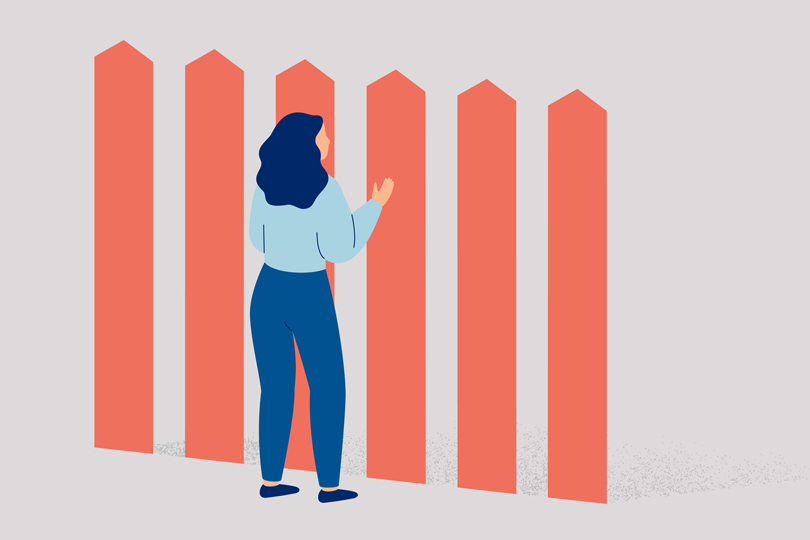By Anne T. Donahue
Over the last little while, we’ve all been talking about boundaries. They’re great! We love them! People we don’t like are hitting the bricks! We’re declining events! We’re learning not to work until we’re close to physical death! Ultimately, we’re all getting a lot better at saying “no thank you” which is good and great. I’m a big fan of it, and an even bigger fan of not feeling bad when I do it myself.
Yet outside the realm of interacting with terrible people, meeting triggers of mental and emotional pain, and/or being asked to work for free (unless you want to, and then it’s called “volunteering”), my relationship with boundaries has floundered. On paper, I understand that we’re practicing the art of saying “I can’t.” But in practice, the line between having boundaries and engaging in regular society is still pretty blurred. At least for me.
I say this because I think I’ve been conflating boundaries with not engaging with people, place, or things (animals, vegetables, or minerals if you’re nasty). Because in actual day-to-day life, it’s harder to categorize every exchange or obligation as part of a binary system. I know my own limits, but I also know that sometimes those limits will be tested because life is hard and I have to move in a world filled with people and things I might not necessarily like. I also know that sometimes I have to give more than I get back because we don’t live in The Sims. As a proponent for boundaries, this can be tricky. I want to consistently prioritize myself, but I want that in the same way I want to earn a million dollars a day for doing puzzles and hanging out with my cats: ‘tis but a dream, you beautiful moron.
But this weekend, I had a good talk with my mom. I was complaining to her about a situation that is no longer relevant and was ultimately solved once I had something to eat and took a nap, and she said: “Maybe you have to start going into certain situations aware that you’re not going to get anything out of them.” Reader, that was revelatory. I stood staring at her like Cillian Murphy in most Oppenheimer stills and allowed her genius to permeate my hair and brain. Perhaps the key to setting boundaries is merely a shift in thinking. Maybe I just have to stop assuming everything I do or everybody I engage with will serve to enrich my life.
Do I suffer from main character syndrome? Absolutely. I am the star of my own film, and most of the time, that film is just the dance sequences in Center Stage. Admittedly, part of my strained relationship with setting boundaries has been assuming that unless I leave a situation feeling inherently better, it’s a write-off. But that’s not realistic: most things we do don’t make our lives better. Most things we do are obligatory, or acts of selflessness, or because we know somebody would be really hurt if we didn’t go to their dog’s baptism. (Note: I have never done this, but I’m assuming one day it will happen, and who am I to devalue that.) Just because I don’t want to write an exam at 8 30 on a Thursday morning doesn’t mean I don’t get to do it. Just because I don’t love small talk with someone I barely know doesn’t mean I get to turn around and walk away from them. Just because I don’t want to go to the party doesn’t mean I get to bail on a friend’s big soiree I RSVP’d to in February. Boundaries aren’t an excuse for you to be a dick (even though I do love being a dick). They’re supposed to help keep you standing so you don’t turn into dust.
Assuming everything I do should and must enrich my life has turned me into dust. I’ve taken a term my therapist used to help me learn to stop being a doormat and manipulated it to the point of it dictating my entire ethos. Do I think boundaries are important? Absolutely! Are they an excuse to be a shitty friend or family member or customer at Starbucks? They are not. I may be thinking, “Nobody talk to me, I am tired and cranky and ready to die” but that doesn’t mean I get to talk to the barista like they don’t have feelings.
As the boundary conversation in pop culture continued, I was starting to wonder why it was making me feel less and less like I knew what they actually were. I know that when I’m too tired or need to chill out, I can – and do – say no to impromptu hangs. I know that when I’ve left a paper for the last possible minute, I need to reschedule plans with pals. I know that when somebody’s fucked up in a way I find irredeemable, I can remove myself from their sphere in a way that doesn’t make it awkward for mutuals (or at least I try). But I also know that sometimes, I’ll have to go to things, or make an impossible schedule work, or be in the same room as somebody I strongly dislike. And that’s when it’s time to adapt my approach to boundaries: instead of bailing, I can let myself exist in a space without expectation or giving anything at all. Reserving your own bandwidth can be a boundary, too.
Maybe I’m alone in thinking this approach is revelatory. Maybe you’ve all been practicing this for eons and I’m late to the game and embarrassing myself in ways I can’t possibly imagine. But it’s comforting to think that setting a boundary can mean not exerting yourself. When you go into a mandatory situation expecting nothing but an hour of your time spent sipping ginger ale, it’s easier not to engage with the behaviour that necessitated setting boundaries in the first place. Recently, I kept plans despite being tired and not wanting to do anything. But instead of assuming everyone there needed to be treated to a headlining act (me), I scaled back, let everybody else lead, and left feeling better. Maybe I’m just learning that boundaries can also simply be space. And in that newly created space, there’s a lot more room to change and grow.
Need a little more Anne? Read more from Anne T. Donahue right here!












